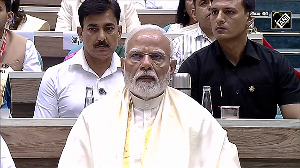 The government of Prime Minister Yingluck Shinawatra is in deep waters on account of the inept handling of the flood situation. Her political obituary is being written even as she is struggling to keep the Bangkok flood under control, says TP Sreenivasan
The government of Prime Minister Yingluck Shinawatra is in deep waters on account of the inept handling of the flood situation. Her political obituary is being written even as she is struggling to keep the Bangkok flood under control, says TP Sreenivasan
The bar on the Chao Phraya river is the pride of Bangkok's Mandarin Oriental Hotel. Watching the tiny waves and the gold fish frequently coming to the surface would intoxicate anyone even without the flowing cocktails. But this week, the river looks threatening, with water about a meter higher than normal, just about to overflow.
Every day there are evacuation drills in the hotel, driving tourists away to hotels perched higher in the city. But the bar is still crowded as there is still time before the city gets between 30 centimetres and 1.5 metres of water across 50 districts of Bangkok. About 400 million cubic metres of flood water are now in an area north of Bangkok and poised to flow in.
Bangkok's water draining capacity is just 30 million cubic metres a day and flooding of most of the city is inevitable and panic is gripping the people minute by minute.
My jet-setting host, Raj Marwah, appeared unsure for once as to where to go and for how long. But he holds several bookings to different places he would go to depending on the length of the flood waters remaining in Bangkok. He is buying extra suitcases to carry warm clothes in case he lands up in cold countries. In fact, everyone who can afford to leave Bangkok is leaving and the government of Prime Minister Yingluck Shinawatra is encouraging people to leave the city. She said that the flood barriers would be maintained in key areas, but added that the chances of those being breached was 50 per cent.
In fact, the government itself is in deep waters on account of the inept handling of the situation even before the flood arrived. A leading newspaper had a cartoon showing the young lady prime minister sinking and crying for rescue herself. Her political obituary is being written even as she is struggling to keep the flood under control.
Panic is palpable everywhere, though people are going about their business with sandbags piling up in the dry and warm city.
The workers at the Royal Bangkok Sports Club were seen watering the golf greens after piling up sandbags around the pretty golf course, which is like a basin in the midst of skyscrapers. The water hazards may soon turn into a vast swimming pool, swallowing the fairways and the greens with unknown consequences to the golf course. Even in the present situation, rules do not permit them not to water the greens!
The flood situation is on everybody's lips. The famous Bangkok tailors, who make suits in hours even while you wait, say that all the workers have gone to take care of their homes. Massage parlours all around the city have their shutters down. With tourists moving out, there is no point in keeping the services going either. Even shopkeepers blame the flood situation for shortage of goods in the shops.
Special concerns are being voiced about the safety of the palaces and temples dotting the city. But the highly revered monarch, who has been the pillar of stability in Thailand, a country of frequent military coups and change of governments, has stated that the government should not be overly concerned about the Royal Palace because he believes that water should flow naturally. The message from him is that he is more worried about the ordinary Thai citizens than about himself and the royal family. Not even a democratically elected leader will take such a position. The people are thrilled and they sing his praises. At the same time, his palace and the hospital in which he has been staying for the last one year is under special protection.
Ironically, flood brings shortage of drinking water because fear of pollution of water sources drives the people to drink bottled water. Water everywhere without a drop to drink is the classic description of a flood. Shop shelves are getting empty, but not only drinking water is coming from abroad, but also water purifying machines are being flown in from China to meet the demand.
Natural calamities occur unexpectedly and suddenly and leave death and destruction. But the flood in Thailand is slow in coming and there is always hope that a miracle will hold the dykes and the fear will turn out to be unfounded. The pain of waiting for a calamity may be even worse psychologically, like when a date is set by astrologers for the world to end. Astrological predictions go wrong, but scientific predictions tend to come true. The eerie feeling that even with so much of warning, mankind can do little to avert a disaster must underline the vulnerability of human beings.
Going away is only a short-term solution even for those who can afford to leave. No one knows how long the water will stay as no such flooding has taken place in Bangkok for 50 years. Some predict that it may take as much as a month for the water to recede. The damage from such flooding will be incalculable as of now. My host's Thai driver says that his house is already under water and he does not know whether any of his belongings will be usable after the waters recede.
Demand for houses in the low-lying areas affected by the flood has already plunged and those who had booked homes to be built later in the year are already walking out of contracts. In parallel, demand is rising for safer areas. The Thai economy is inevitably in for a spin. Rice farmers have already stopped pledging their crops to the government for fear of failure of crops and some of them are changing to other crops that can withstand the fury of floods.
Public holidays have been declared for several days to permit people to go away from Bangkok. But the domestic airport is closed on account of flooding and flights are being diverted to the Suvarnabhumi international airport. But it is to the credit of the Thais that they remain disciplined without causing traffic jams or chaos. I was advised to leave for the airport four hours in advance, but there was no heavy traffic or confusion.
Having arrived at the airport early, I decided to record my impressions of a city bracing bravely for the fury of the floods. We can only wish the residents well.
T P Sreenivasan is a former ambassador of India to the United Nations, Vienna, and a former Governor for India at the International Atomic Energy Agency, Vienna. You can read more of his writings here
Image: A flooded street in Bangkok. Photo: Bazuki Muhammad/Reuters








 © 2025
© 2025